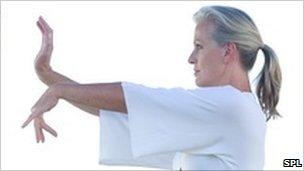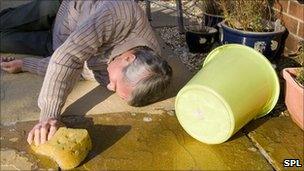Tai Chi prevents elderly falls say geriatrics societies
- Published

New guidelines recommend Tai Chi to prevent falls
Tai Chi lessons and reduced medication should be used to prevent falls in the elderly, according to experts in the UK and the US.
The latest thinking on tackling falls is included in new guidelines for doctors, published in the Journal of the American Geriatrics Society.
Falls are one of the leading causes of death for old people.
Age UK said implementing the recommendations was crucial for improving services.
A third of over 65s and half of over 80s will fall each year, and it is thought that 14,000 people in the UK die as a result.
Treatment costs the NHS in England around £4.6m a day.
New guidance
Experts from the British and American Geriatrics Societies have reviewed the medical research since the last set of guidelines was published in 2001.
The updated advice recommends exercises which improve strength and balance such as the Chinese martial art Tai Chi.
It also acknowledges that medications which affect the brain, such as anti-depressants and sleeping pills, are strongly linked with falls.

Researchers says falls are as serious as heart attacks
These drugs should now no longer be prescribed or the dose reduced. In 2001, this was only recommended when patients were taking more than four drugs.
When doctors assess the risk of falling they should now also examine feet, home safety and the fear of falling.
Other recommendations include prescribing vitamin D supplements, raising low blood pressure and cataract surgery.
Doctor Mary Tinetti, who revised the guidelines and is from Yale University School of Medicine, said: "Falls are one of the most common health problems experienced by older adults and are a common cause of losing functional independence.
"Given their frequency and consequences, falls are as serious a health problem for older persons as heart attacks and strokes."
Dr Finbarr Martin, consultant geriatrician at Guy's and St Thomas' NHS Foundation Trust, said Tai Chi was important: "It focuses on balance rather than strength which is less important for most older people who are actually strong enough, but Tai Chi is not good for the very frail."
Andrew Harrop, director of policy and public affairs at Age UK, said: "Currently there are large variations in the quality of falls prevention services provided across the UK and it is crucial that these guidelines are put into practice to ensure that future falls are prevented.
"With research showing that programmes for improving strength and balance can reduce the risk of falls by as much as 55%, the recommendation that interventions for preventing falls should include an exercise component is particularly welcome."
- Published21 June 2010